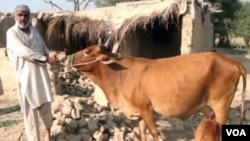“This was one of the most emotional stories we’ve ever done,” says Shahnaz Aziz, host of Urdu’s weekly radio program, Meri Kahani or My Story.
She is talking about the story of Falik Sher, a desperately poor and blind man in Pakistan’s Punjab state who works at a flower mill for about a dollar a day. Asked on the show what he would want in a perfect world, he said, “You know, my children eat their bread without any curry or milk. In my village, almost everyone owns a cow. If I had a cow, they would be so lucky.”
The story sparked the interest of philanthropist and educator Abbas Bhatti, who appeared on the same program and said he had seen the man profiled on local television, but no one had helped him. Bhatti decided to personally donate a cow to Sher, after discovering he was mistakenly listed by the government as being well-to-do, and therefore, unqualified for aid.
“I was crying, the producer was crying, it was so touching,” said host Shahnaz Aziz, “but this is the kind of impact we are having.” The picture above is of Sher the day he got his cow.
The Urdu Service's weekly show has built a reputation for emotional and sometimes heart-warming programs. Each show focuses on the personal stories of three or four people, who describe life in his or her own words. Someone from a charitable organization or an expert then discusses the story with the host, and callers are invited to comment. Most of those featured on the program get help as a result of their appearance.
Earlier this month, another program dispelled the stereotype of the angry anti-American mullah preaching at Friday prayers. One caller to the show said the local mullah in the town of Noor Pur Thal was urging people to listen to the VOA program. Caller Mohammad Saeed said the mullah described Meri Kahani as conveying a message of humanity and said he was a regular listener himself.
She is talking about the story of Falik Sher, a desperately poor and blind man in Pakistan’s Punjab state who works at a flower mill for about a dollar a day. Asked on the show what he would want in a perfect world, he said, “You know, my children eat their bread without any curry or milk. In my village, almost everyone owns a cow. If I had a cow, they would be so lucky.”
The story sparked the interest of philanthropist and educator Abbas Bhatti, who appeared on the same program and said he had seen the man profiled on local television, but no one had helped him. Bhatti decided to personally donate a cow to Sher, after discovering he was mistakenly listed by the government as being well-to-do, and therefore, unqualified for aid.
“I was crying, the producer was crying, it was so touching,” said host Shahnaz Aziz, “but this is the kind of impact we are having.” The picture above is of Sher the day he got his cow.
The Urdu Service's weekly show has built a reputation for emotional and sometimes heart-warming programs. Each show focuses on the personal stories of three or four people, who describe life in his or her own words. Someone from a charitable organization or an expert then discusses the story with the host, and callers are invited to comment. Most of those featured on the program get help as a result of their appearance.
Earlier this month, another program dispelled the stereotype of the angry anti-American mullah preaching at Friday prayers. One caller to the show said the local mullah in the town of Noor Pur Thal was urging people to listen to the VOA program. Caller Mohammad Saeed said the mullah described Meri Kahani as conveying a message of humanity and said he was a regular listener himself.





